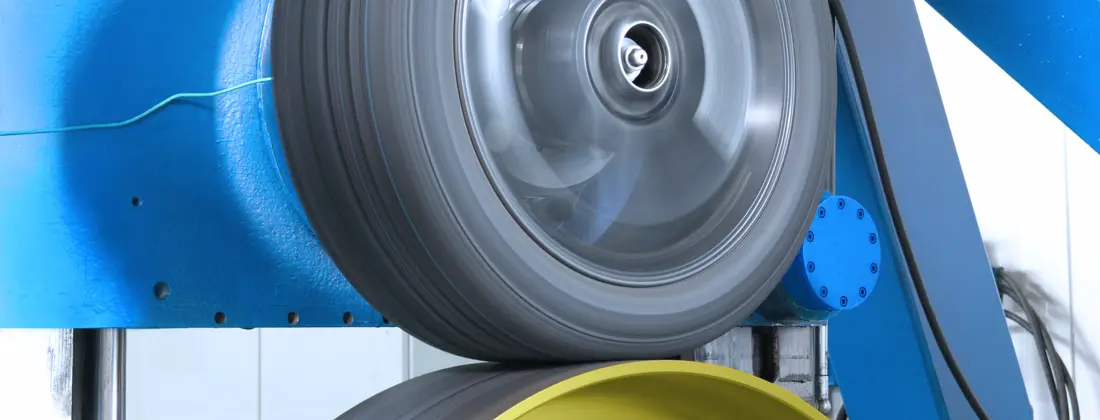JIS D4237 Motorcycle Tyre Speed Performance Testing
The JIS D4237 standard is a crucial benchmark in the automotive testing sector, particularly for motorcycle tyres. This test evaluates the speed performance of motorcycle tyres under controlled conditions to ensure they meet safety and reliability standards set by international regulations. The procedure involves subjecting tyre samples to high-speed rotations on specially designed test rigs that simulate real-world driving scenarios.
The JIS D4237 test is not just about achieving a certain speed; it also ensures the tyre maintains its structural integrity and performance at these speeds without compromising safety or causing damage. This is achieved through rigorous testing protocols, which include:
- High-speed rotation of tyres on test rigs
- Monitoring of tyre deformation under load at high speeds
- Evaluation of the tyre's resistance to heat build-up and wear during speed trials
- Visual inspection for any signs of structural failure or damage
- Measurement of noise levels generated by the tyres during testing
The test parameters are strictly defined, ensuring consistency and repeatability. The specimen preparation involves selecting representative tyre samples that accurately reflect the production batch's characteristics. This ensures that each sample tested is as close to a real-world scenario as possible.
During the test, various instruments are used to monitor critical aspects such as temperature, speed, and deformation. These instruments provide real-time data which helps in making informed decisions about the tyre’s performance. The results of these tests are then compared against the JIS D4237 standard to determine whether the tyres meet the required specifications.
Quality managers and compliance officers rely on this testing process to ensure that their products comply with international standards, thereby protecting consumers from potential hazards associated with substandard tyre performance. R&D engineers use these tests as part of their development cycle to improve tyre designs and materials. Procurement teams also benefit by ensuring the suppliers they choose meet these stringent quality benchmarks.
The JIS D4237 standard is essential for maintaining safety standards, especially in high-performance vehicles like motorcycles where speed and handling are critical factors. By adhering to this testing protocol, manufacturers can ensure their tyres are not only fast but also safe and reliable under all driving conditions.
Eurolab Advantages
At Eurolab, we pride ourselves on providing comprehensive tyre testing services that meet the highest international standards. Our advantages in JIS D4237 motorcycle tyre speed performance testing include:
- State-of-the-Art Facilities: Equipped with cutting-edge test rigs and advanced instrumentation, our facilities are designed to replicate real-world driving conditions accurately.
- Rigorous Quality Control: Our team of experts ensures every tyre sample is tested under the same rigorous protocols, providing consistent and reliable results.
- Comprehensive Reporting: We provide detailed reports that not only meet but exceed international standards. These reports are invaluable for quality managers and compliance officers in making informed decisions.
- Expertise and Experience: Our engineers have extensive experience in tyre testing, ensuring they can offer valuable insights to R&D teams looking to improve their products.
- Customer-Focused Approach: We understand the importance of timely results. Our efficient processes ensure that you receive your test reports quickly without compromising on quality.
By choosing Eurolab for JIS D4237 motorcycle tyre speed performance testing, you can be confident in the reliability and accuracy of our services. Our commitment to excellence ensures that every tyre tested meets or exceeds international standards.
Quality and Reliability Assurance
The importance of quality and reliability assurance in the automotive sector cannot be overstated, particularly when it comes to motorcycle tyres. Eurolab’s robust approach to quality control is central to our testing services. We employ a multi-layered process that ensures each tyre sample undergoes thorough evaluation before being deemed compliant with JIS D4237 standards.
Our facilities are equipped with the latest technology, including high-precision test rigs and sophisticated data acquisition systems. These tools allow us to capture detailed information about the tyres' performance under various conditions. The process begins with careful specimen preparation, ensuring that each sample is representative of its batch. This step is crucial for accurate testing and reliable results.
The actual testing phase involves subjecting the tyre samples to high-speed rotations on our test rigs. During this period, we monitor critical parameters such as temperature, speed, deformation, noise levels, and more. Our advanced instrumentation provides real-time data that helps us make precise evaluations of each sample. This level of detail ensures that even minor deviations from the standard are identified.
After testing, our team conducts a thorough visual inspection for any signs of structural failure or damage. This step is essential in ensuring that the tyres meet not only speed performance standards but also safety and durability requirements. The final assessment involves comparing the test results against the JIS D4237 standard to determine compliance.
The comprehensive nature of our quality control process ensures that every tyre tested at Eurolab meets or exceeds international standards. This commitment to excellence is reflected in the detailed reports we provide, which are invaluable for quality managers and compliance officers. Our engineers can offer valuable insights to R&D teams looking to improve their products.
Environmental and Sustainability Contributions
- Eco-Friendly Test Equipment: We use energy-efficient test rigs that minimize our carbon footprint during testing.
- Resource Efficiency: Our facilities are designed to maximize the use of resources, ensuring minimal waste generation.
- Recycling Initiatives: Any non-conforming samples are recycled in line with international regulations.
- Educational Outreach: We offer training programs and workshops on tyre testing and sustainability best practices.
By integrating these environmental and sustainability initiatives into our operations, Eurolab plays a proactive role in reducing the industry’s impact on the environment. Our commitment to eco-friendly processes ensures that we contribute positively to the global effort towards sustainable development.





